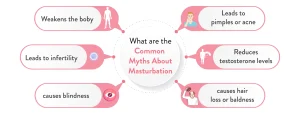
Masturbation is defined as the act of self-stimulating or touching the genitals or sensitive areas of the body for sexual arousal or pleasure. It is considered a normal and common practice among people of all backgrounds, genders, or races.
According to a study by the ‘National Center for Biotechnology Information’ across all the countries, around 41% to 65% of men, and 27% to 40% of women reported masturbating in the past months.
Several studies have shown that masturbating has positive effects on both mental and physical health including reducing stress & tension, improving sleep quality, elevating mood, preventing anxiety and more. Masturbating has no risk of getting pregnant and it’s very rare to catch a sexually transmitted infection (STI) through masturbation.
There is no research or fact proving that masturbation is harmful and it is not known to cause serious side effects, however, many people who masturbate may experience unwanted side effects like – fatigue, distraction, decreased sexual sensitivity, guilt, etc. though these side effects are commonly associated with excessive masturbation.
Also Read: Cause and Symptoms of Premature Ejaculation
There are several common myths about masturbation, though these myths have not been proven by scientific research. Let’s uncover the prevalent myths and facts behind:
None of the scientific research proves that masturbating affects eyesight.
It is one of the most widespread misconceptions, masturbation does not affect fertility in men or women, rather it can help keep sperm healthy in men.
Masturbation was and is commonly believed for causing weakness, dehydration, etc. However, research suggests that it does not cause weakness unless done excessively.
This misconception has been debunked by scientific studies. It is a natural process and doesn’t affect the quality or frequency of erections. In truth, it can help with erectile dysfunction that’s caused by stress, anxiety, or other psychological issues.
Also Read: Types, Cause, Symptoms, Prevention, Diagnosis, Treatment of Male Sexual Disorder
Masturbation may cause temporary hormonal changes, however, these changes are minimal and do not contribute to acne or pimples.
The saying ‘everything in excess is opposed to nature’ by Hippocrates holds true when it comes to this natural process. Masturbation is a healthy activity when done in moderation. The effects also vary from person to person. Masturbation, if done excessively, can have physical, psychological, and social side effects. Some of the side effects include:
Masturbating excessively can have certain physical side effects like:
Frequent friction can cause irritation, soreness, redness or discomfort.
Masturbation if done excessively without rest can cause excess release of dopamine causing fatigue.
Repeated contractions can cause muscle strain in the lower abdomen and pelvic area.
Due to overstimulation, sexual pleasure may be affected.
These side effects can be managed through practicing moderation, seeking medical advice in case of persistent physical discomfort, and adopting mindful practices like paying attention to the body’s signals.
Another side effect of frequent masturbation can result in:
Masturbating frequently may create unrealistic expectations that affect real-life intimacy.
Guilt or shame may arise due to personal, religious or cultural beliefs
Spending too much time masturbating may lead to neglecting relationships and responsibilities.
Excessive masturbation can lead to mental exhaustion, reducing productivity
Societal stigma around masturbation can also cause individuals to feel guilty, and even affect the relationship due to guilt or shame associated. Social side effects can be managed by reducing the frequency, exercising, maintaining a healthy lifestyle to boost testosterone, and engaging in real intimacy.
Moderation is the key – when it comes to masturbation. Masturbation is not harmful but overindulgence can have certain side effects.
Also Read:

Infertility caused by masturbation is a common myth. Masturbation does not cause infertility in men and women. According to various research, masturbation can help keep the sperm healthy. Infertility in men may be caused by various medical conditions. Similarly, masturbation in women does not affect ovulation, egg quality, or reproductive health.
Another very common misconception is that masturbation causes hair loss or weakness of bones. These myths are not backed up by any scientific research. Ejaculation can be related to reducing testosterone levels, though it has no long-term effect on testosterone levels. Similarly, weakening bones are caused by ageing, calcium/vitamin D deficiency, or lack of exercise.
Masturbation releases dopamine leading to relaxing the body, this may make a person feel less focused for a short time but does not affect long-term memory or brain function. There is no scientific report mentioning that masturbation affects brain cells, memory loss, etc. Memory loss can be caused by factors like lack of sleep, stress, poor diet & dehydration, etc.
The bottom line is that moderation is important when it comes to masturbation. Excessive indulgence can lead to certain side effects and discomfort. Masturbation is a normal activity and is known to have several health benefits.
Masturbation is defined as the act of self-stimulating or touching the genitals or sensitive areas of the body for sexual arousal or pleasure.
Start with focusing on other activities (playing sports, joining a club or social group, etc.), exercise, spend time with friends and family, or seek a therapist.
No, there is no scientific research proving masturbation causes hair fall.
No, masturbation does not cause weight loss.
Masturbation is known to have several health benefits if done in moderation.
No, masturbation does not cause pimples or acne.
No, masturbation doesn’t usually cause a reduction in sperm count.
Masturbation can have several side effects if not done in moderation.
Written and Verified by:

Similar Fitness and Wellness Blogs

Request a call back